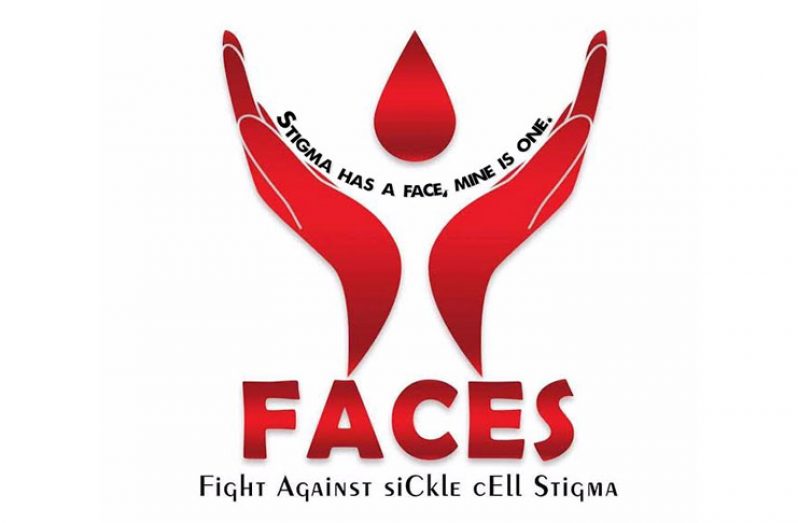— FACES calls for better healthcare
FACES – a non-governmental organisation that is committed to the fight against sickle cell stigma – is advocating for Government to safeguard the human rights of sicklers, and to ensure that they receive the highest quality of healthcare.
The call comes days after a “sickler” (person with Sickle Cell disease) attempted to end the struggles of having to fight against the illness and simultaneously fight for quality medical care.
It is alleged that the sickler attempted to drink an overdose of pills about two days ago, after experiencing a “crisis” and allegedly feeling a sense of discrimination while receiving treatment at the Georgetown Public Hospital Corporation (GPHC).
Sickle cell anaemia is caused by an abnormal type of haemoglobin called “Haemoglobin S”. Haemoglobin is a protein inside red blood cells that carries oxygen to all parts of the body.
Passed down through families, sickle cell anaemia is a condition where the red blood cells that are normally shaped like a disc, take on a sickle or crescent shape.
The abnormal cells deliver less oxygen to the body’s tissues and can easily get stuck in small blood vessels and break into pieces. Because of the presence of these abnormal cells, there is an interruption of healthy blood flow, cutting down on the amount of oxygen flowing to body tissues.
Almost all people with sickle cell anaemia have painful episodes called ‘crises.’ These can last from hours to days. Crises can cause pain in the lower back, leg, joints, and chest. Some people have one episode every few years. Others have many episodes each year and these crises can be severe enough to require hospitalisation.
FRUSTRATION
In a message to the President of Fight Against Sickle Cell Discrimination (FACES) Sabrina Kazim, the sickler in distress wrote: “I was discharged, I am still having pain and its telling on my nerves because the pain in my bones is wrecking my nerves and I can’t take it anymore and I can’t get to sleep at night and I am so fed up with the hospital running. I have been taking the medication at home and the situation remains the same. I am so depressed… I can’t continue to burden my family with my struggle. Only who feels it knows it!”

It is alleged that last month, when the sickler, in question, was admitted to the Male Surgical Ward at GPHC, he was severely discriminated against while experiencing a painful crisis.
According to the “sickler,” the nurses on duty at the time refused to give him the opioid pain medication “Pethidine”, although his treatment sheet stipulated the times per day he was supposed to be given it.
Several pleas were made before the pain medication was given to the “sickler.” It was also alleged that the “sickler” was given a wrong injection. It was explained that a nurse administered a morphine injection to the patient although his chart stated that he is allergic to morphine. The nurse reportedly apologised profusely and quickly went and got the relevant drugs to combat the allergic reaction, which the patient started to experience.
When in crisis, the ordinary medicine or drug will not work for “sicklers.” Morphine and pethidine, which are controlled narcotics, are usually administered however, at the level of medical institution during a period of admission. When patients in ‘crises’ visit the hospital, ‘too often’ for treatment to be administered, some medical personnel not convinced that they are truly in crisis, reportedly take a non-cooperative approach.
NOT THE FIRST
When contacted, President of FACES told the Guyana Chronicle that this is not the first time a “sickler” like herself has complained of stigma and discrimination in the wards of GPHC.
Kazim said stigma and discrimination were among issues that led her to form the organisation FACES. Upon hearing of the troubles faced by the “sickler,” Kazim said she made contact with the GPHC Chief Executive Officer (CEO) Allan Johnson, who apologised for the treatment meted out to the “sickler,” and promised to correct the situation.
To effect positive changes, Kazim said she has reached out to the First Lady Sandra Granger, Public Health Minister Volda Lawrence and Social Protection Minister Amna Ally.
“Through FACES, I am hoping to work with the ministers and the First Lady to make the life of “sicklers” better. “Sicklers” would indicate their frustration from time to time, and I truly believe that it is time, the issues facing “sicklers” be addressed,” Kazim posited.
She said there has been significant improvement since FACES has been actively spreading awareness about the negative impact stigmatisation and discrimination have on “sicklers” as it relates to the administration of opioids.
Guyana, she said, however, is nowhere close to addressing the problems facing “sicklers,” pointing out that at some private medical hospitals, sicklers are still “blatantly” being denied pain medication.
According to Kazim, FACES will soon be teaming up with international and local organisations to ensure medical institutions adhere to the standards established for the treatment of “sicklers.”
“I know we are not in this fight alone, and so I am calling on all stakeholders to assist us by contributing food, pharmaceuticals and other hampers to distribute to each “sickler” in the organisation. We can be contacted on 592-661-1705,” Kazim said.



.jpg)











